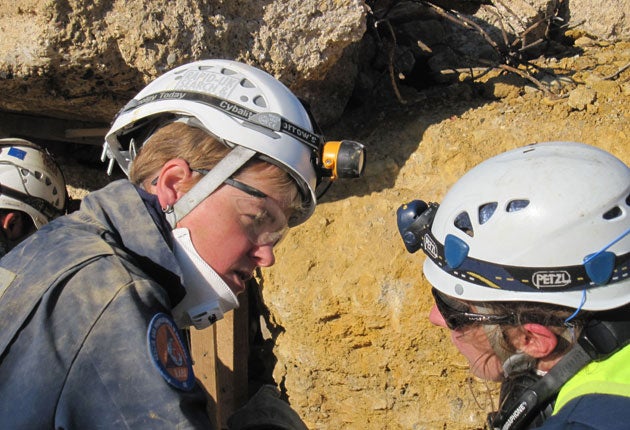Search and rescue: 'I received a text from Rapid UK just after 11pm. Within an hour we had team ready to go'

Your support helps us to tell the story
From reproductive rights to climate change to Big Tech, The Independent is on the ground when the story is developing. Whether it's investigating the financials of Elon Musk's pro-Trump PAC or producing our latest documentary, 'The A Word', which shines a light on the American women fighting for reproductive rights, we know how important it is to parse out the facts from the messaging.
At such a critical moment in US history, we need reporters on the ground. Your donation allows us to keep sending journalists to speak to both sides of the story.
The Independent is trusted by Americans across the entire political spectrum. And unlike many other quality news outlets, we choose not to lock Americans out of our reporting and analysis with paywalls. We believe quality journalism should be available to everyone, paid for by those who can afford it.
Your support makes all the difference.Sophie Hensley, 41, arrived in Haiti last Thursday as part of Rapid UK's disaster relief team. Yesterday she spoke exclusively to The Independent on Sunday from the UN command and control centre at the airport in Port-au-Prince where she is helping to co-ordinate more than 30 international search and rescue teams. She described the huge difficulties faced by the Haitians and the rescue workers trying to help them.
"There is no water here; the UN has not resolved the water issue. Rapid UK are the only people who have a full-capacity water filter with them, which we are using to filter truckloads of water, to give to as many of the fire teams as we can. It is unbearably hot, over 35 degrees, and the dogs, and us, work better at night – when it's cooler and quieter.
"A female police officer was pulled out of the collapsed UN police college at 22.30 on Friday by our team and Haitian fire service personnel after a five-hour rescue. She was put on a drip to protect her kidneys before we lifted the rubble off her. She had crush injuries including a broken femur and was taken to an NGO field hospital; we don't know how she is... often we never find out. The whole mission is being co-ordinated from the airport by the UN. There are now 30 search and rescue teams, with over 1,000 rescue workers and 100 canines.
The bulk of us are based at the airport, but the French, Americans and Chinese are staying in their own embassies. We're based next to the UK Fire Service and Rapid Latin America – the team we trained from Peru. They got here 12 hours before us and we've been using their equipment until now. A lot of the heavy lifting equipment only arrived today. The machinery to break through concrete walls has been sitting in Santo Domingo, and there isn't that much time left now.
"I received a text from Rapid just after 11pm last Tuesday, an hour after the earthquake hit Haiti, asking me if I was available to go out. Within an hour, we had an operation team on standby, ready to go out as soon as flights and equipment could be organised. Rapid secured four seats on the flight organised by DfID [the Department for International Development] for the official Fire Service search and rescue team. We were all at Gatwick ready to take off at 1500 hours, but the flight was delayed for three hours by bad weather; by this point we were all desperate to get here and starting helping.
"We couldn't get into Haiti because the US military decided only planes smaller than a 737 could land and we were in a 747, which meant we had to land in Santo Domingo, and the UK team had to be broken up and come in on smaller planes. We then had problems trying to land in Port-au-Prince, but eventually we arrived on Thursday, just after two in the afternoon GMT; we got our first operation by 3pm.
"The team was allocated the Carrefour district, just west of downtown Port-au-Prince, known as sector 15. Every building in the sector must be searched until we are sure there are no more live casualties. So far, only five out of 28 affected sectors have been completed. Rescue teams can't get to some areas because there is not enough security; when people have no food, it can create unrest.
"By tomorrow night, the UN will start thinking about shutting down the search and rescue operation, so not being allowed to work at night is a real loss. Night time is the best time for searching, but the UN doesn't think it's safe enough to be out searching past 1900 hours. The only exception is if there is a live rescue going on; then security forces will stay out with the team until they have finished. There are four live rescue operations going on as we speak, but it could be hours until we know if they've been successful."
Ms Hensley normally runs a consultancy firm in Battersea, south London. Her first rescue operation with Rapid UK, which is entirely self-funding, was in Iran after the earthquake in December 2003; she also went to Pakistan in 2005
Join our commenting forum
Join thought-provoking conversations, follow other Independent readers and see their replies
Comments